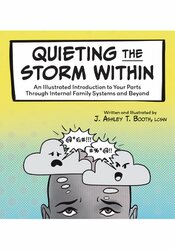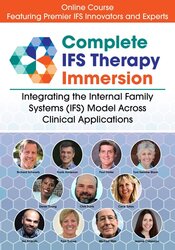Using IFS to Address Existential Angst in a Polarized World

In today’s increasingly polarized and disconnected world, many of us are struggling with feelings of existential angst. The sense that something is deeply wrong, that life lacks meaning or purpose, or that we are disconnected from something greater than ourselves, is palpable for so many. Yet, in the secular age we live in, these feelings are often not given space to breathe. In fact, they’re often dismissed or even judged as “woo-woo,” especially when we venture into the realms of the spiritual.
I’ve been there myself. I’ve done my fair share of dismissing spiritual experiences and questioning their relevance. That all changed when my own spiritual experiences, catalyzed by psychedelics, forced me to find a language and framework for what I was experiencing. I ventured into Kundalini yoga, explored different therapeutic modalities, and eventually worked as a co-investigator on the MAPS-sponsored MDMA-assisted psychotherapy trial for PTSD.
It was during this journey that I discovered Internal Family Systems (IFS) therapy and saw the beautiful overlap with my own experiences. IFS therapy not only helps us understand the multiplicity of our minds, but it also introduces us to the deeper Self—the very thing I was seeking but had no framework for. IFS therapy became my gateway, bridging the everyday struggles my clients face with their deeper spiritual needs.
In our field, the conversation around spirituality in psychotherapy has only accelerated, particularly with the rise of psychedelic-assisted therapy. While I don’t push clients toward any particular belief, it’s become clear to me that spirituality needs to be part of the conversation. In much the same way we’ve learned to recognize and name identities around race and gender, we need to acknowledge the spiritual and existential dimensions of our clients’ lives.
IFS therapy allows us to hold space for these existential questions, questions that so many of us avoid: Who am I? What am I doing here? Who do I want to be? What do I want to create? What am I in service to that is bigger than myself? These questions offer a framework that allows clients to build resilience in the face of a world that can feel overwhelming.
By helping people define their own belief systems, we help them locate themselves within a larger cosmology, something our culture has largely lost. In working with clients who are struggling with existential anxiety, I see those who choose to actively engage with these questions grow stronger, more resilient, and more connected to themselves and the world around them. They have a deepened sense of meaning that those who stay on a smaller scale simply don’t.
That’s why I wrote Quieting the Storm Within. The book lays a foundation for exploring not just the IFS therapy model but also the nature of the Self. It creates space for clients to clarify their values and define who they want to be in the face of life’s challenges. By addressing both the mundane and the spiritual aspects of their lives, we can help people meet their needs—from the base of the pyramid to the top.
Ultimately, it’s my hope that this book opens up conversations about the deeper truths that we often avoid, creating a more empowering and expansive narrative for anyone looking to understand themselves more fully.
I’ve been there myself. I’ve done my fair share of dismissing spiritual experiences and questioning their relevance. That all changed when my own spiritual experiences, catalyzed by psychedelics, forced me to find a language and framework for what I was experiencing. I ventured into Kundalini yoga, explored different therapeutic modalities, and eventually worked as a co-investigator on the MAPS-sponsored MDMA-assisted psychotherapy trial for PTSD.
It was during this journey that I discovered Internal Family Systems (IFS) therapy and saw the beautiful overlap with my own experiences. IFS therapy not only helps us understand the multiplicity of our minds, but it also introduces us to the deeper Self—the very thing I was seeking but had no framework for. IFS therapy became my gateway, bridging the everyday struggles my clients face with their deeper spiritual needs.
In our field, the conversation around spirituality in psychotherapy has only accelerated, particularly with the rise of psychedelic-assisted therapy. While I don’t push clients toward any particular belief, it’s become clear to me that spirituality needs to be part of the conversation. In much the same way we’ve learned to recognize and name identities around race and gender, we need to acknowledge the spiritual and existential dimensions of our clients’ lives.
IFS therapy allows us to hold space for these existential questions, questions that so many of us avoid: Who am I? What am I doing here? Who do I want to be? What do I want to create? What am I in service to that is bigger than myself? These questions offer a framework that allows clients to build resilience in the face of a world that can feel overwhelming.
By helping people define their own belief systems, we help them locate themselves within a larger cosmology, something our culture has largely lost. In working with clients who are struggling with existential anxiety, I see those who choose to actively engage with these questions grow stronger, more resilient, and more connected to themselves and the world around them. They have a deepened sense of meaning that those who stay on a smaller scale simply don’t.
That’s why I wrote Quieting the Storm Within. The book lays a foundation for exploring not just the IFS therapy model but also the nature of the Self. It creates space for clients to clarify their values and define who they want to be in the face of life’s challenges. By addressing both the mundane and the spiritual aspects of their lives, we can help people meet their needs—from the base of the pyramid to the top.
Ultimately, it’s my hope that this book opens up conversations about the deeper truths that we often avoid, creating a more empowering and expansive narrative for anyone looking to understand themselves more fully.
Quieting the Storm Within: An Illustrated Introduction to Your Parts Through Internal Family Systems and Beyond

Quieting the Storm Within, written by Internal Family Systems (IFS) expert Ashley Booth, provides a concise and accessible entry point into the transformative realm of IFS.
Through its captivating visual storytelling, this illustrated therapeutic tool translates complex ideas about parts work into language that is simple and intuitive for anyone to understand.
If you’re a therapist, this book will be your go-to psychoeducational tool for introducing IFS to clients. They’ll learn how to begin meeting their internal family of parts – each with its own agenda, motives, and fears and each striving to fulfill its own needs, sometimes creating conflict and unrest along the way.
If you’re starting your own IFS journey, this guide will help you make sense of it all. With its playful visuals and relatable examples, you’ll begin to understand the roles of your parts and address each of their needs.
Through its captivating visual storytelling, this illustrated therapeutic tool translates complex ideas about parts work into language that is simple and intuitive for anyone to understand.
If you’re a therapist, this book will be your go-to psychoeducational tool for introducing IFS to clients. They’ll learn how to begin meeting their internal family of parts – each with its own agenda, motives, and fears and each striving to fulfill its own needs, sometimes creating conflict and unrest along the way.
If you’re starting your own IFS journey, this guide will help you make sense of it all. With its playful visuals and relatable examples, you’ll begin to understand the roles of your parts and address each of their needs.
Complete IFS Therapy Immersion: Integrating the Internal Family Systems (IFS) Model Across Clinical Applications

Whether you’re brand new to Internal Family Systems (IFS) or have been practicing the model for years, register and discover how to refine and customize the model to fit your client’s unique needs and improve therapeutic outcomes for trauma, anxiety, shame, kids, couples, addictions, eating disorders, LGBTQIA+, racial trauma, and more...
Meet the Expert:
J. Ashley T. Booth, LCSW, has had a unique journey that led her from a career in oceanography to become a prominent psychedelic-assisted psychotherapist, trainer, and researcher in Southern California. She has completed Level 1 training in IFS. You can learn more about Ashley and her work at ashleybooth.net.
Learn more about her educational products, including upcoming live seminars, by clicking here.
Learn more about her educational products, including upcoming live seminars, by clicking here.



